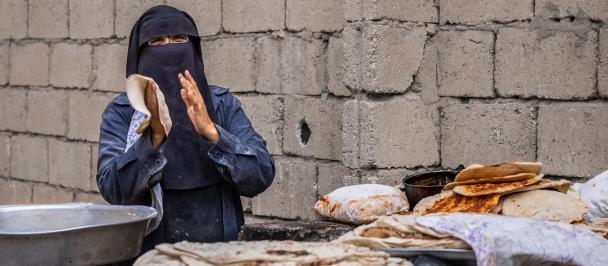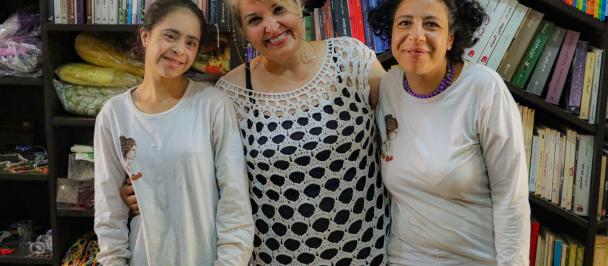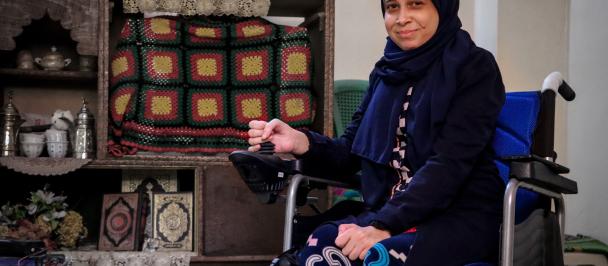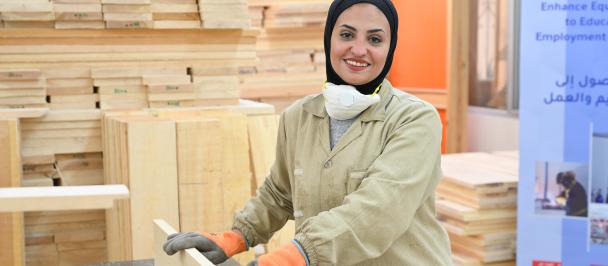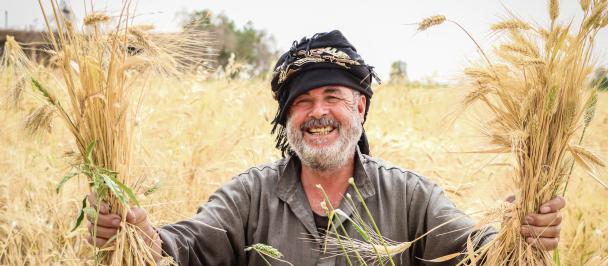Questions and Answers
A conversation with UNDP Resident Representative in Syria following the earthquake
March 15, 2023
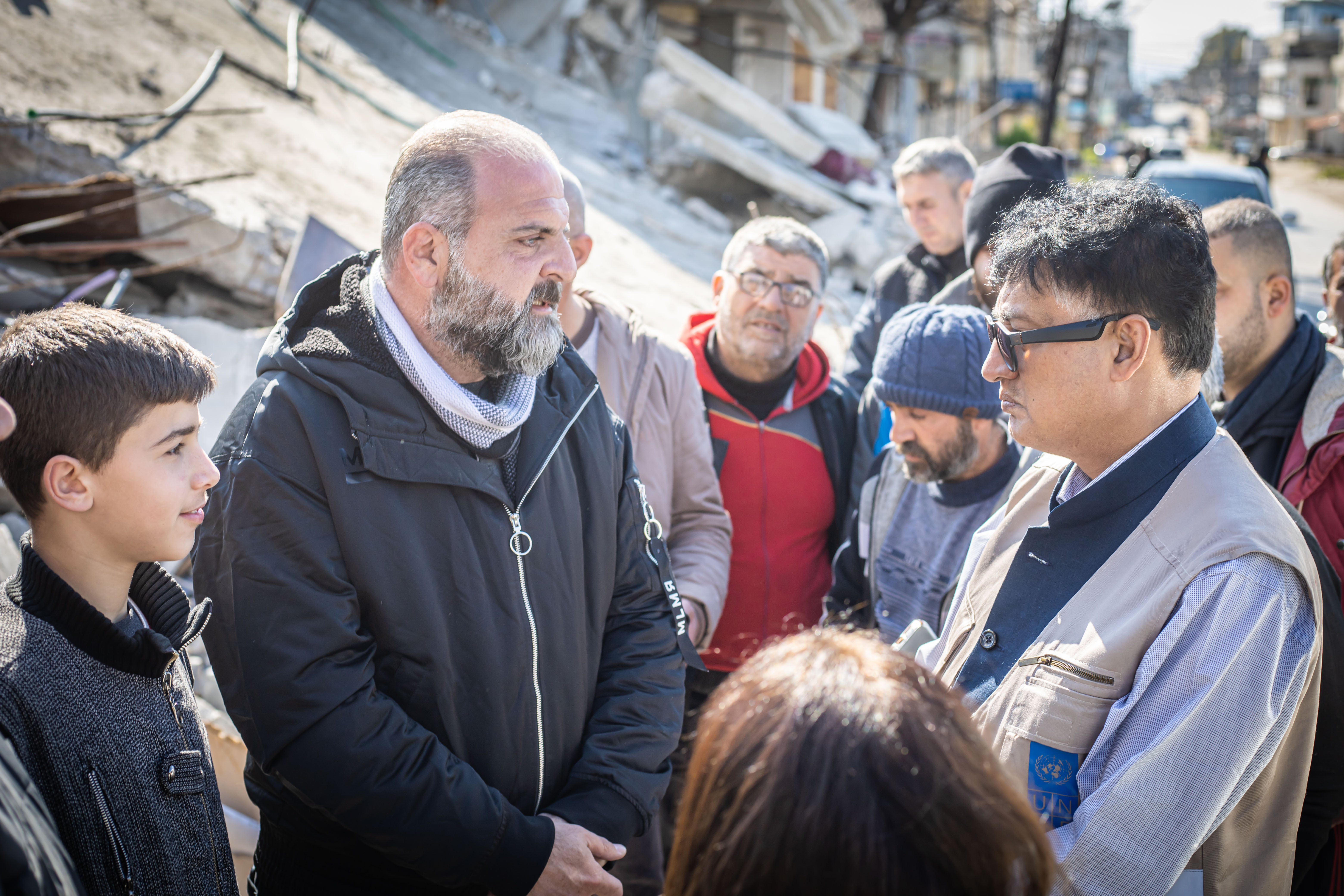
UNDP Syria Rep Mr Sudipto and team on the ground visiting affected infastructure in Lattakia and meeting with people
What were your first impressions on arriving in areas directly impacted by the earthquake?
My visits to the earthquake-affected governorates were a complete eye-opener. Even before I travelled there, I had realized that I had been entirely wrong in assuming that the conditions in 2022 were the worst ever in Syrian history. This was when nine in ten people are living in poverty and over 15 million people were in dire need of humanitarian assistance after 12 long years of compounding effects of multiple crises that include the active conflict and large-scale displacement; the progressive breakdown of essential services (like water and electricity; health and education); consecutive years of severe drought, the Lebanese financial meltdown which affected millions of Syrians; the COVID-19 pandemic, the massive depreciation of the Syrian Currency and then a Cholera outbreak followed by a major scarcity of fuel. The catastrophic event of 06 February came at a significantly higher cost as it caught millions completely unprepared with shock and despair, soon turning into a total collapse of hope. Although unsurprising, years of capacity depletion had rendered the local authorities ill-equipped to respond to a disaster of such magnitude. The bereft of adequately trained staff, essential equipment, fuel, etc., were up against the odds. Even the field staff of the humanitarian agencies were affected, limiting their response capacities.
Not only the collapse of numerous buildings had resulted in thousands of deaths and tens of thousands of severe injuries it has left large numbers of people in a complete state of trauma, mostly homeless or much too scared to go back indoors. As most buildings housed both homes and businesses, supplies of day-to-day goods were disrupted, and many jobs were lost overnight. Many survivors struggled to bury their near and dear or attend to those in hospitals while also patiently waiting for experts with equipment to remove debris and help them retrieve their valuables buried under the rubble.
Most makeshift shelters lacked proper management capacities, and facilities were inadequate for the thousands they were housing. I visited two such shelters and found both swarming with thousands of children, women and men, many with disabilities without anything to keep them warm. Most residents I met were in complete shock and needed immediate psychosocial support. The most noticeable gaps were the lack of any partitions for privacy and the very few functioning toilets. Many lacked proper water supply and lighting, exposing the shelter inhabitants, especially women and children, to serious public health and protection risks. While relief supplies were pouring in, proper distribution based on actual needs was yet to start. Even the number of people within the shelters was changing, with many new families moving in and many others who had managed to find better alternatives with families or friends moving out.
I was also struck by the sea of humanity around me. Anybody and everybody, be them faith groups, local associations, even families and individuals who felt able to help, were out and about distributing food and other essentials or simply volunteering to help in any form.
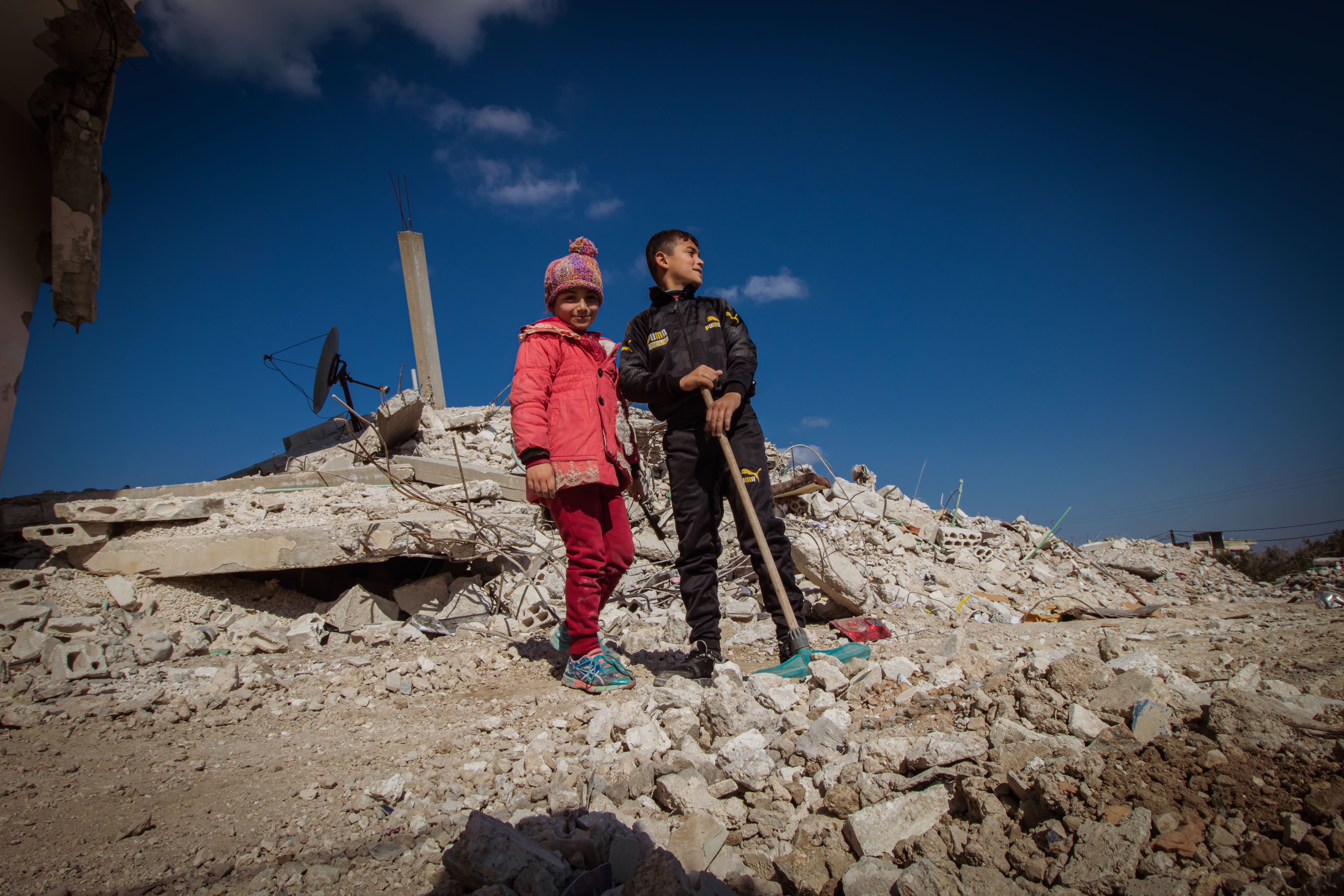
Kids walking around destroyed buildings in Lattakia city and going through the rubble following the earthquake that hit Syria and Turkey on 06 February 2023
What are people's immediate needs, particularly in these winter months?
To my mind, the most pressing need is to find proper shelter, restore basic services like water supply, sanitation and access to energy and ensure that all protection needs are adequately met. Warm clothing and bedding materials must be on the top of the list of non-food items. Children need to be brought back to school, and debris in public spaces needs to be moved and adequately disposed of to improve mobility. Together with this, we will also need to quickly restore livelihoods through emergency jobs so that not only some sense of self-reliance is restored but also to help heal faster by making the victims feel helpful and productive.
How is this balanced with providing longer-term support?
In a situation like Syria, immediate assistance and medium to long-term support must commence together. No one can afford to wait until tomorrow for recovery to start. This means that we will have to begin immediately to look at supporting the rehabilitation of homes that are reparable and, where not feasible, help in finding alternate shelter solutions, including, where required facilitating access to legal and other technical help for those facing challenges to Housing, Land and Property Rights.
To make the homes liveable, services must be restored. Small businesses that have lost assets and have either had to shut down or are struggling to remain afloat will need recovery assistance. That, in turn, will help regenerate stable jobs and economic opportunities. Ways and means to restore essential services will need to be put in place. This includes removing and adequately disposing of debris, ensuring that compensation is well-targeted, environmental damage is quickly assessed, and restorative measures are advocated for and supported. Targeting based on objectivity and precision will be necessary to ensure that no one is harmed or feels unduly excluded. It will always be more sustainable if executed through partnerships that help reinforce each other's work and together accelerate both recovery and healing.
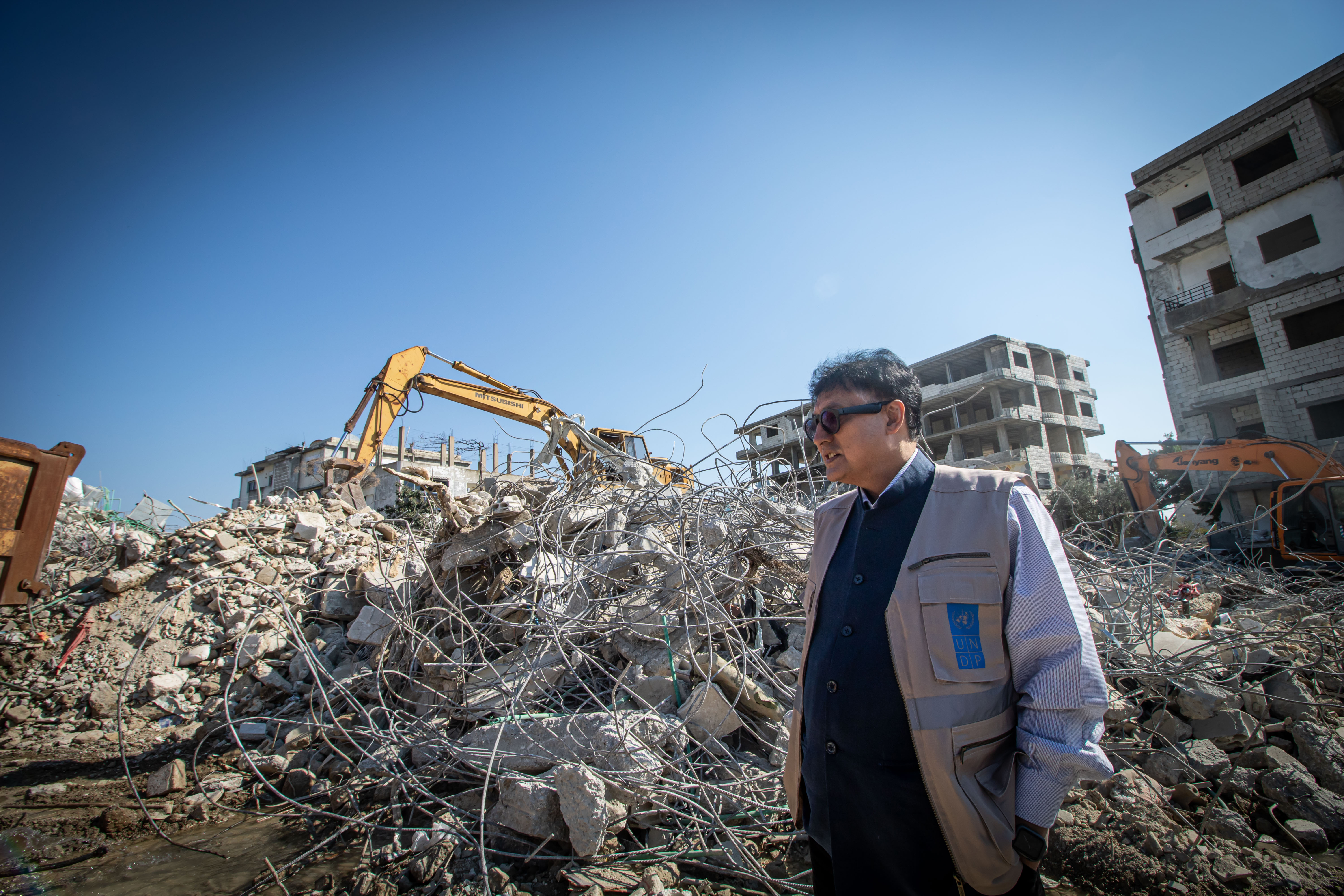
A distructed building in Stamo area in Lattakia following the earthquake that hit Syria and Turkey on 06 February 2023
What are the priorities for the next 6 to 12 months?
UNDP, together with partners, will support the rehabilitation of public facilities (such as schools, training institutes, health facilities, and citizen's service centres) damaged by the quake and restoration of basic services, especially those related to water supply, irrigation, solid waste management, large scale debris removal and safe disposal, electricity and renewable energy solutions to restore dignified living conditions and livelihoods. UNDP will also look at safe and dignified shelter solutions for those rendered homeless and who cannot afford to rebuild quickly.
UNDP will also support the recovery of small businesses and, in turn, enhance access to durable and dignified economic opportunities. Capacity gaps at the local and community levels in disaster risk management will also need to be quickly assessed and addressed as part of the recovery process.
How can UNDP provide support to early recovery following a 12 – year protracted crisis?
Our work is defined by going deeply local with our interventions and using our area-based approach to reach the most vulnerable to the best of our abilities.
Our early recovery approach helps communities restore normalcy, people to preserve their dignity, and delivery systems strengthened to build resilience. In Syria, UNDP is on the ground, delivering development solutions to complement humanitarian efforts. We have an established presence in Syria. We operate through a “Whole of Syria” approach, through seven field offices, covering 14 governorates, while focusing on serving the people and leaving no one behind.
Syria remains one of the world’s most complex humanitarian and protection emergencies. Millions of Syrians are being pushed to the brink of survival, with 6.8 million people displaced inside the country, and at least 6.6 million are living as refugees outside of Syria.
I hope that this earthquake has highlighted the urgency to move towards a definitive solution to the Syria crisis, bringing Syrians together in safety and dignity, and putting an end to the obstacles that are hindering an inclusive recovery and the advancement of the legitimate aspirations of the people in Syria.
Lack of recovery leads to unnecessary loss of lives. We need to put people above politics. The population in Syria will bear the brunt of anaemic recovery assistance, both prior to the earthquake and, after it, if we do not act now.

 Locations
Locations